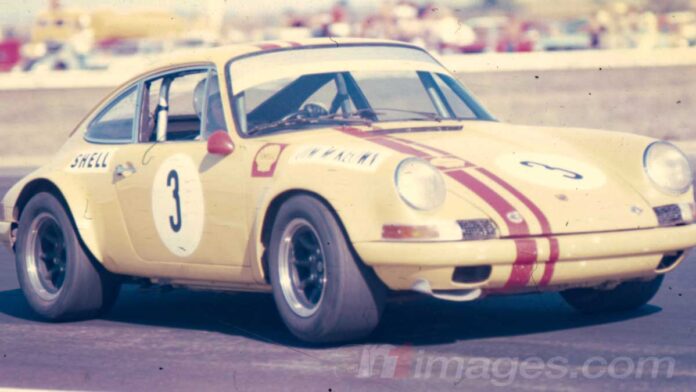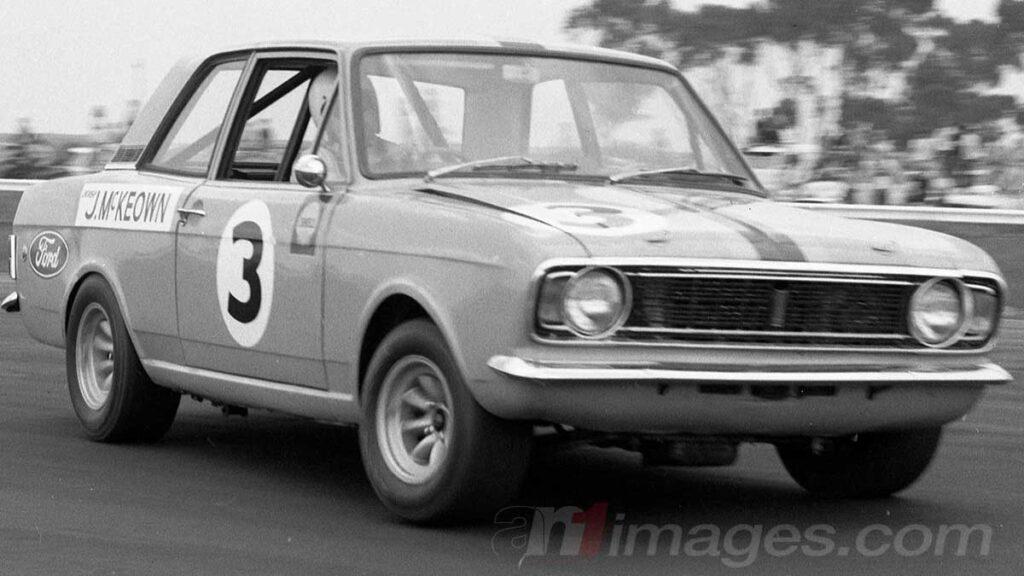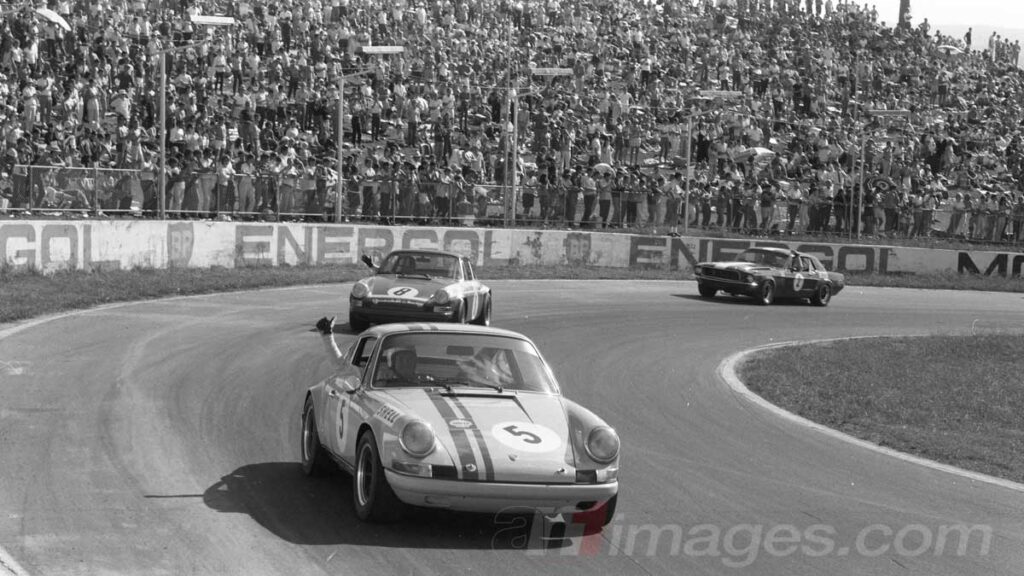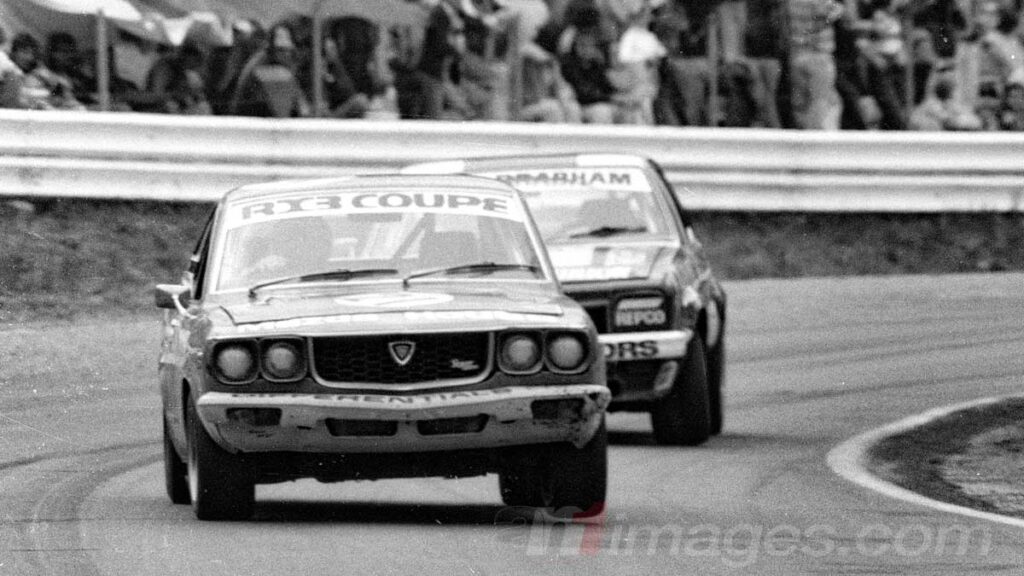
JIM McKeown, a legend of Australian touring car racing in the 1960s and early 1970s, has passed away at age 85.
McKeown rose to prominence in touring car racing in the 1960s as part of the three-car Neptune Racing Team, the petrol company backing his Lotus Cortina along with Norm Beechey’s Holden EH and Peter Manton’s Mini.
However, his racing career began in the 1950s when he won a Ford Zephyr in a raffle during the Moomba Festival, which he immediately sold to buy an Austin Healey that he raced and hillclimbed around Melbourne’s outskirts.
He soon moved into a Holden 48-215 and then a Vauxhall Special, before success aboard a Ford Cortina in touring car races in Victoria attracted the Neptune backing.
Pole position for the 1964 ATCC title race at Lakeside etched McKeown into the record books; although he retired from the race after hitting a crashed car, he remains one of just four drivers to qualify on pole position for their ATCC/Supercars debut.
McKeown prepared his own car out of his Neptune petrol station, automotive repair shop and towing business in Kilsyth, near the Dandenong Ranges in Melbourne’s east. With help from clever engineers like Peter Holinger, Jack Godbehear, George Wade and Eddy Thomas, McKeown evolved the blue Cortina from a standard road car into a potent race weapon.
It was hailed as the fastest Lotus Cortina in the world by an up-and-coming Allan Moffat, who raced an ex-works car against McKeown in his early days in Australia.
“We had some pretty hectic races I can tell you,” McKeown told the Shannons Club in 2013.
“I particularly remember the fight we had for the 1966 South Australian Touring Car Championship at Mallala. There wasn’t much left of either of our cars when we’d finished!”

McKeown moved to the Mk.II Cortina for 1968 at the insistence of Ford Australia, which supplied him with lightweight bodyshells and panels plus a host of the best competition parts from overseas.
The sponsorship from Neptune subsequently became black with Trident branding, then yellow and red with Shell branding, but the support prevented McKeown from moving into a V8-powered touring car – the company was already supporting Beechey’s.
That led McKeown to switch to a Porsche 911S for the 1970 season, and he beat the big V8s at Warwick Farm and Symmons Plains to claim a pair of race victories on the way to finishing second behind Beechey’s Holden Monaro in the final championship standings.
However, the German sports cars were eventually legislated out of Improved Production touring car racing at the end of the 1971 season and, after a season racing Alfa Romeos, McKeown moved across to the emerging Sports Sedan class where the Porsches were still eligible.
After initially campaigning a 911 RSR, McKeown and Porsche distributor Alan Hamilton devised a 911 Sports Sedan that was essentially a turbo-powered 908 sports car underneath, but it had a short competitive life before being banned by CAMS.

McKeown was also among the early class winners of what became the Bathurst 1000 prior to its move to Mount Panorama.
He drove a Volkswagen Beetle in the 1962 race with George Reynolds, a future ‘Great Race’ winner, and the pair claimed victory in Class D for cars with a purchase price of less than £900.
He only made a handful of appearances in the race once it moved north, including in 1963 when he and Reynolds took another Volkswagen to third place in the small car class.
McKeown next returned as part of the works Ford team in 1968, co-driving with open-wheel ace Spencer Martin in an XT GT Falcon fitted with an automatic transmission. The pair qualified seventh but finished down in 42nd after a lengthy delay.
“The shrink ring holding the wheel bearing on came off and the left-rear axle pulled out at Griffins Bend. It came up and went over and speared through the bootlid,” McKeown told Australian Muscle Car Magazine in 2014.
“I actually got it going again. I had to walk down to the pits, get all the spare parts, fit it all and then get going again. I worked with the car on the side of the track, with everyone whizzing past me.”
He paired up with Shell stablemate Beechey in a Valiant Charger for the 1971 race, and they finished a delayed 12th after low oil pressure and a gearshift problem in what proved the latter’s final Bathurst 500 start.

McKeown made one final ‘Great Race’ appearance, posting an 11th-place finish in 1976 aboard a Mazda House-backed RX-3. In a twist of fate, his co-driver that day, Geoff Leeds, also passed away earlier this week.
His frontline competition career ended with the banning of the Porsche turbo Sports Sedan in the mid-1970s, but McKeown maintained his motorsport links through historic racing and briefly joined the Porsche Cup field in 2000 before a back injury prompted him to withdraw from the class.
McKeown’s racing legacy also had links that stretched into the Supercars era. His former workshop in Kilsyth is now the site of a Phil Munday’s Panel Works, and Munday’s 23Red Racing was originally headquartered on the other side of Mt Dandenong Road.
The V8 Sleuth team extends its condolences to McKeown’s long-time partner Toni, his family and friends.
